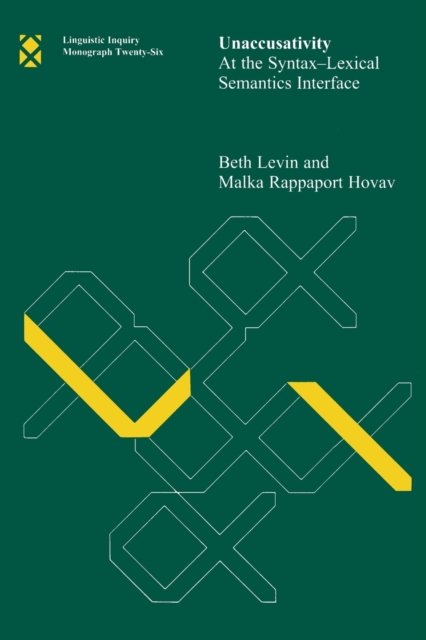
Unaccusativity : At the Syntax-Lexical Semantics Interface Paperback / softback
by Beth (Stanford University) Levin, Malka Rappaport Hovav
Part of the Unaccusativity series
Paperback / softback
Description
Besides providing extensive support for David Perlmutter's hypothesis that unaccusativity is syntactically represented but semantically determined, this monograph contributes significantly to the development of a theory of lexical semantic representation and to the elucidation of the mapping from lexical semantics to syntax. Unaccusativity is an extended investigation into a set of linguistic phenomena that have received much attention over the last fifteen years.
Besides providing extensive support for David Perlmutter's hypothesis that unaccusativity is syntactically represented but semantically determined, this monograph contributes significantly to the development of a theory of lexical semantic representation and to the elucidation of the mapping from lexical semantics to syntax.
Perlmutter's Unaccusative Hypothesis proposes that there are two classes of intransitive verbs - unergatives and unaccusatives - each associated with a distinct syntactic configuration.
Unaccusativity begins by isolating the semantic factors that determine whether a verb will be unaccusative or unergative through a careful examination of the behavior of intransitive verbs from a range of semantic classes in diverse syntactic constructions.
Notable are the extensive discussions of verbs of motion, verbs of emission, and various types of verbs of change of state.
The authors then introduce rules that determine the syntactic expression of the arguments of the verbs investigated and examine the interactions among them.
The proper treatment of verbs that systematically show multiple meanings - and hence variable classification as unaccusative or unergative - is also considered.
In the final chapter, the authors argue that the distribution of locative inversion, a purported unaccusative diagnostic, is determined instead by discourse considerations.
Linguistic Inquiry Monograph No. 26
Information
-
Available to Order - This title is available to order, with delivery expected within 2 weeks
- Format:Paperback / softback
- Pages:350 pages
- Publisher:MIT Press Ltd
- Publication Date:07/12/1994
- Category:
- ISBN:9780262620949
Information
-
Available to Order - This title is available to order, with delivery expected within 2 weeks
- Format:Paperback / softback
- Pages:350 pages
- Publisher:MIT Press Ltd
- Publication Date:07/12/1994
- Category:
- ISBN:9780262620949






